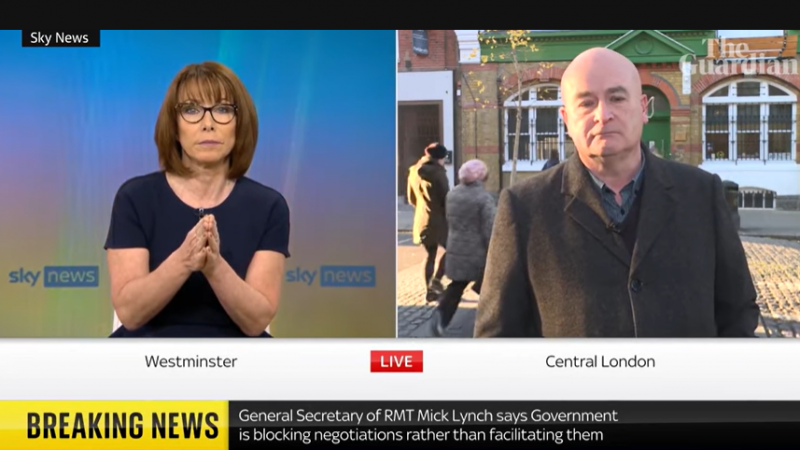The RMT general secretary has been brightening up our television screens again this week with his straight-talking responses to the strike action fall-out.

Here’s a recap of some of the best Mick Lynch interviews of the week.
‘Absolutely, that’s exactly what I’m saying’
He told Sky News that the government are sabotaging negotiations with trade unions over the upcoming rail strikes. In an interview on December 8, Kay Burley asked: “So are you saying that this government is purposely scuppering any chance of a deal?”
To which Lynch replied: “Absolutely, that’s exactly what I’m saying. They have torpedoed the negotiations and they have told the companies to take on the strike because what you heard in the Commons yesterday from Rishi Sunak, acting tough he’s given into his backbenchers on all sorts of things about planning permissions and other issues, so he is going to try and make the RMT and the other trade unions the bogeymen and all the rest of it and they want this strike action to go ahead when there are solutions and possible solutions that railway management railway executives could put to us to try and get a resolution and they are stopping that from happening.”
Dispute ‘will be indefinite’ if Tories refuse to step down
Speaking at the RMT offices on Wednesday night, Lynch accused ministers of inserting the controversial issue of driver-only trains into negotiations – scuppering any chance of a deal. The trade unionist said the union will “go down on this issue” and will not accept driver-only trains “in any form.” When asked if the dispute could continue indefinitely unless the government backs down, Lynch said:
“It will be indefinite if that’s their position.”
Lynch slaps down BBC presenter
Following the announcement of a fresh wave of rail strikes from Christmas Eve, the union chief clashed with the BBC’s Justin Webb over train staffing levels.
During an interview on BBC Radio 4’s Today programme, Webb suggested that driver-only operated trains have guards on board. Lynch coolly replied:
“No they don’t.” He explained that driver-only operation was “less safe” than having guards on board.
Webb then said: “I’m about to go home on a driver operated train from Victoria. I don’t feel that it’s going to be unsafe.
“It feels – doesn’t it – unrealistic to a lot of people who go on these trains every day?”
To which Lynch hit back, saying:
“So the answer I was going to give you is that women and many disabled passengers have told us on countless times that they want to see a staffed train because they want greater accessibility to the railway, which is a legal requirement of the railway companies, and they feel that a staffed train is better and more safe and more welcoming than an unstaffed train.
“So we want to maintain that and we also believe that it’s safer in terms of train dispatch, in terms of trap and drag, and the protection that’s afforded to people during times of disruption.”
The RMT general secretary pointed to the train collision at Watford and the fatalities at Stonehaven, and the intervention of the guard who called the emergency services and helped protect passengers.
Webb replied: “But the guards are still there.”
Lynch hit back: “The guards aren’t there, they proposed to remove them.”
The BBC journalist added: “No, driver operated only trains surely have a second person on the train it’s just that they’re not operating the doors.”
To which Lynch replied: “No they don’t always have a second person on the train.
“Most DOO [Driver Only Operation] services don’t have anyone on the train apart from the driver.”
‘No-one is being represented properly except the super-rich’
In another blunt interview with Politics Joe this week, the RMT general secretary explained how ‘nobody is being represented properly except the super-rich.’ Instead, Lynch said, it is the super-rich oligarchs that own the likes of the Express, the Mail, the Sun and the Telegraph, that represent people’s class interests.
Lynch said that there was a need for a ‘generalised response’.
“Well I definitely think there needs to be coordination between trade unions, the government is at the source of all these problems at the moment.
“But we need a generalised response, whether or not we can get a generalised strike or not is a matter of waiting to see what develops, but I definitely think there will be generalised action as we go through into the New Year,” he added.
Gabrielle Pickard-Whitehead is a contributing editor to Left Foot Forward
Image credit: YouTube screen grab
To reach hundreds of thousands of new readers we need to grow our donor base substantially.
That's why in 2024, we are seeking to generate 150 additional regular donors to support Left Foot Forward's work.
We still need another 117 people to donate to hit the target. You can help. Donate today.



